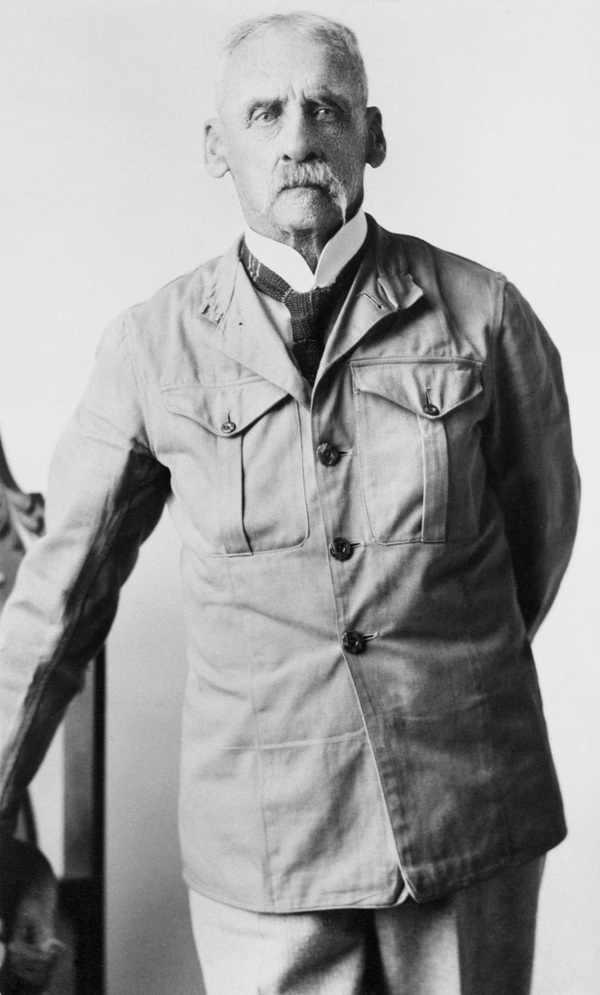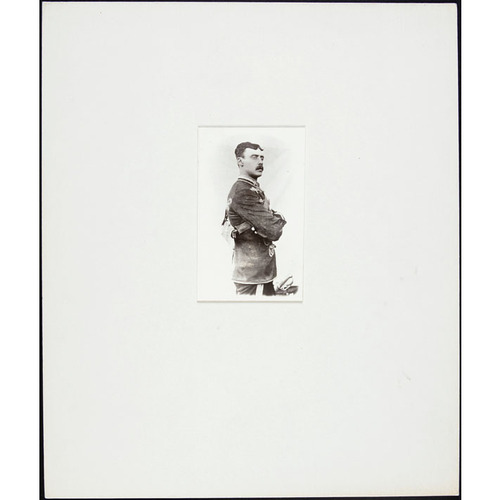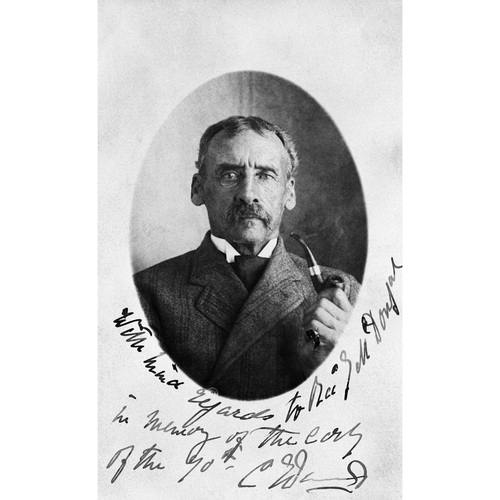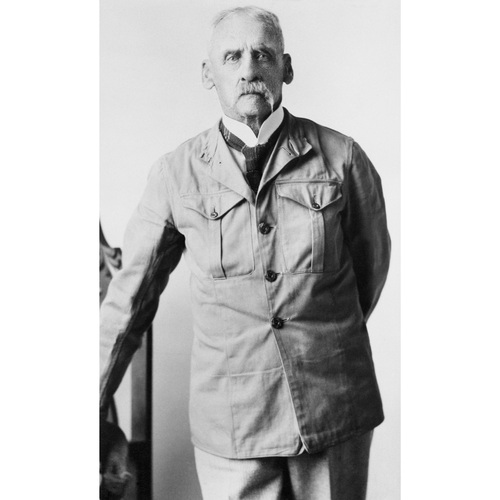
Source: Link
DENNY, Sir CECIL EDWARD, NWMP officer, Indian agent, author, and archivist; b. 14 Dec. 1850 in Shedfield, England, elder son of the Reverend Robert Day Denny and his second wife, Frances Johnson Kerton Waller; d. unmarried 25 July 1928 in Edmonton.
Cecil Edward Denny was educated at Cheltenham College in England in 1862-63 and in France and Germany. At 19 he emigrated to the United States, where he farmed south of Chicago. In April 1874 he joined Canada’s North-West Mounted Police as a constable but, trading on a recommendation by Sir Stafford Henry Northcote, he secured appointment as a sub-inspector on 11 May, before his contingent left Toronto for Manitoba under the command of Commissioner George Arthur French. Denny took part in the Long March west and he remained at Fort Macleod (Alta) during the winter of 1874-75. In March 1875 he accompanied Assistant Commissioner James Farquharson Macleod*, guide Jerry Potts*, and two constables on a trip to Helena (Mont.) that has become part of the Mounties’ legend. Caught by a storm, the men were nearly frozen to death and were only saved by Potts’s skill.
That summer F Division, under Éphrem A. Brisebois*, with Denny second in command, marched north to build a new post, Fort Brisebois, subsequently Fort Calgary (Calgary). Brisebois was an uninspiring leader and Denny, who got on well with his troops, was away for much of the winter. By spring the men were mutinous. Brisebois resigned in August 1876 and Denny was left in command until Lief Newry Fitzroy Crozier* arrived to take charge. Crozier remained at Fort Calgary until late 1877 or early 1878, after which Denny was the senior officer. In 1880 Calgary was reduced to an outpost and Denny was transferred to Fort Macleod.
Fort Calgary was in the northern territory of the Blackfoot and Denny had come to like and respect them. Although he recognized that they would have to adapt to changing circumstances, he was usually as generous and flexible as his official position allowed. Apparently the Blackfoot liked and trusted him. In August 1876 Blackfoot chief Crowfoot [Isapo-muxika*] told him that the Sioux had proposed a joint attack on the Cree and the whites. The Blackfoot rejected the alliance and Crowfoot sought, and received, assurance from Denny that if the Sioux attacked the Blackfoot, the police would come to their assistance.
Denny attended the negotiation of Treaty No.7 in 1877 as a member of the police escort, signed the treaty as a witness, and assisted in the initial payments. Although the leading figures, both native and white, were enthusiastic about the treaty, Denny recalled that “many of the Indians . . . were dissatisfied that any treaty had been made at all.” He believed that the sham battle staged after the signing was only half in jest. During the negotiations Crowfoot had suggested that the Blackfoot, the Blood, and the Sarcee should share a common reserve along the Bow River. The concentration strengthened the Blackfoot’s bargaining position and increased Crowfoot’s prestige. Within a year, however, the Blood had opted for a separate reserve near Fort Macleod. Crowfoot was not consulted on the change and it fell to Denny to tell him. Not surprisingly, Crowfoot was annoyed and Denny considered the meeting the most difficult he had had as a policeman.
By the spring of 1879 the buffalo had been exterminated on the Canadian plains. The Blackfoot were starving and they appealed to Denny at Fort Calgary for aid. By July he was distributing 2,000 pounds of beef per day. This issue, which was made on his own authority and contrary to his instructions, was a humanitarian reaction, but it was also a recognition of reality. Denny reported that if he did not feed the Indians “they will take the matter into their own hands and help themselves.”
When necessary, then, Denny bowed to the inevitable. In other cases he mediated. In the summer of 1880 he intervened in a dispute between large Cree and Blackfoot camps near Blackfoot Crossing (Alta). The Cree were preparing to avenge the killing of one of their number by the Blackfoot. Denny, with only six policemen to back him, induced the Blackfoot to offer compensation and then persuaded the Cree to accept the offer. Negotiation did not always work. The Sarcee, like the Blood, were unhappy sharing a reserve with the Blackfoot. In November 1880 they moved to Fort Calgary and demanded that they receive their rations there. The lone sergeant at the post had little choice but to issue supplies and to send for help. Denny led the relief force, eight men and a sergeant. After three days of tense negotiations, the Sarcee agreed to go to Macleod for rations. The next morning, when the camp showed no signs of moving, Denny lined his men up with loaded rifles and he and his sergeant began to pull down the tents. Although a shot was fired over the sergeant’s head, they continued, and the Sarcee decided to move rather than fight.
Denny was forced to resign from the NWMP on 6 June 1881 after Percy Robinson, a clerk in the Indian department at Fort Macleod, sued him for having induced his wife to desert him, and “for having criminal connection with her.” Although Denny was found not liable, he was subsequently judged guilty of having broken into Robinson’s house and having threatened to beat him. His relationship with Victoria Robinson did not end at this time – it seems probable that he had at least one child with her.
Denny had been an able officer and some officials accepted his explanation that the Robinson affair was an attempt to blackmail him. In October 1881 Indian commissioner Edgar Dewdney* appointed him as Indian agent at Fort Walsh (Sask.). The following January he was transferred to Blackfoot Crossing, where a dispute over rations threatened to erupt in violence. The trouble was settled before he arrived, but only after a substantial display of force. Crowfoot, usually a supporter of the police, had played a role in defying them and Dewdney hoped that Denny, as an “old friend,” could influence the chief. Initially Denny was given charge of the northern part of Treaty No.7 but within a few months he was made agent for the whole treaty area, which covered most of modern Alberta south of the Red Deer River.
Denny blamed the trouble at Blackfoot Crossing on an inequitable system of distributing rations and on the men in charge. He described them as a “rough class of Americans . . . who dislike Indians and are not very choice in the language they use towards them.” He reformed the issue of rations, replaced some employees, and distributed the tools the Indians at Blackfoot Crossing needed to begin farming. He “found the Blackfoot willing to work had they received assistance but they had been badly neglected.”
As an agent, Denny encouraged the Indians to take up agriculture and abandon their traditional ways. Sometimes he had to temporize. When the Blood wished to retaliate against horse-stealing raids by Cree from the Cypress Hills, Denny provided the leader, White Calf [Onista’poka*], with a letter to Commissioner Acheson Gosford Irvine at Fort Walsh, asking for his help in recovering the horses. White Calf took about 200 warriors with him, far more than Denny had expected. Denny was criticized for condoning a war party but he argued that, by directing what could not be prevented, he had avoided a larger clash. Denny tried to reduce the incidence of horse stealing and raids by enrolling some members of the Blood warrior society in an informal police force. The force occupied the more restless spirits in the camp, brought them under Denny’s influence, and provided a counterbalance to Red Crow [Mékaisto*], the head chief. Denny also tried to dilute Red Crow’s authority by promoting the election of an ineffectual leader, Calf Tail, as a second head chief.
Within months of his arrival in Treaty No.7, Denny had become embroiled in a dispute with the inspector of Indian agencies, Thomas Page Wadsworth. The pretext for the dispute was Denny’s lax, perhaps corrupt, administrative style, but it was exacerbated by jurisdictional disputes and personality differences. At a more fundamental level, Wadsworth represented the government’s drive to reduce expenses. Denny favoured a more generous policy of gradual reduction. On his arrival at Macleod he had dismissed an employee who had been issuing rations, in part because he had found a surplus of 60 sacks of flour on hand. Such a surplus, he reasoned, “cannot be got if the Indians have been getting their full rations; for my part I would rather see the flour short than over.” Although he was often accused of currying favour with the Indians through his liberal issue of supplies, he actually reduced government commitments by striking many individuals off the band membership lists. On the Blood Reserve, for instance, he reduced the number from 3,542 to 2,589. During the summer of 1883 there was an unusual amount of sickness and death among the Indians of Treaty No.7. The doctor who investigated the outbreak attributed it to the poor quality of the flour issued as rations. Although Denny had certified the flour, tests revealed it to be several grades lower than the standard contracted for, and some of it was tainted with weed seeds. It was not clear whether Denny had been careless in his certification or whether he had been in collusion with the contractors. The matter would probably have resulted in his dismissal had not another development intervened. When the Department of Indian Affairs ordered Denny to lay off many of his staff, he protested to Dewdney on 14 Jan. 1884 that he could not manage the agency properly and then he resigned. On 15 Mar. 1884 he wrote a bitter letter to the minister, complaining of his treatment, condemning Ottawa’s management of Indian affairs in Treaty No.7, and predicting trouble “costly to the government.”
Trouble came in Treaty No.6, not in No.7. When Denny heard of the clash at Duck Lake in late March 1885 between the Métis and the NWMP [see Gabriel Dumont*], he offered his services to Dewdney. He was temporarily placed in charge of Treaty No.7 and his first act was to increase rations to the Blood. At Blackfoot Crossing he found that the Blackfoot had received messages urging them to join the rising. Crowfoot may have been sympathetic but he was pessimistic about the chance of success. When the Blood and the Peigan made it clear that they would not join, Crowfoot declared his loyalty to the crown. A confident Denny told Dewdney in April that “if any trouble is caused it will be the fault of the whites and not the Indians.”
The most likely source of trouble was Thomas Bland Strange, a retired British officer, a rancher, and the commander of the Alberta Field Force. He had a strained relationship with the Blackfoot, whom he suspected of killing his cattle. He issued orders to his ranch hands and to members of his field force to fire on anyone found running off horses or killing stock. Denny objected that the Blackfoot were loyal and he tried to ensure that no militia would enter their reserve without his permission. With Dewdney’s support, he threatened to withdraw Indian agents if Strange did not quit interfering. On Denny’s advice, Dewdney countermanded Strange’s orders that Indians were to be confined to their reserves. Denny also intercepted insulting and threatening messages from Strange to Crowfoot. The situation was resolved only when Strange left Calgary for Edmonton during the rebellion.
Dewdney was pleased with Denny’s work and used him to sound out opinion in Treaty No.7 during the winter of 1885 –86, but he did not give Denny the permanent reappointment he expected. Possibly the Indian department had decided that Denny’s conciliatory, but expensive approach to managing the Indians was no longer necessary. As well, Denny’s personal life had made him enemies. Father Albert Lacombe* described him as “a notoriously dissolute character, a libertine and addicted to the excessive use of alcohol,” one who should never be employed by the Indian department. In Ottawa its deputy superintendent general, Lawrence Vankoughnet, regarded him as a “morally bad man” and “thoroughly unprincipled.”
While he was still a police officer, Denny had started ranching on a small scale. In 1878-79 he imported a small herd of cattle and claimed land near Fort Calgary. He sold this claim to his partner, John Stewart, in 1882-83, and established a second ranch north of Fort Macleod. It was not a success and he abandoned it about 1890.
Denny’s life, in fact, was coming unravelled and his name appeared in court reports several times between 1885 and 1894, mainly for charges involving liquor. The most serious incidents were two charges of “shooting with intent” brought by Victoria Robinson and Corporal George Greenacre of Macleod in 1892. By their account someone had broken into her house and set fire to some bedding. She and Greenacre had surprised the intruder and given chase in the dark. The fugitive fired on them and fled but was caught. It was Denny. His defence was that he was the victim of a series of coincidences, possibly contrived to discredit him. A jury acquitted him.
During the years 1890-1922 Denny supported himself by a series of short-term jobs. He was a police scout, a herder at the Milk River quarantine station, and a night-clerk in a Lethbridge hotel. In 1897-99 he was in the area of Fort Steele, B.C., as a prospector, jailer, newsagent, and justice of the peace. By 1900 he was in Montana working as a miner/prospector and fire-ranger. He was employed as a packer on the Peace River–Yukon trail from 1904 to 1906, on railway construction, and around 1913-17 as a fire-ranger in the Lac la Biche area of Alberta. In October 1916 he homesteaded near Colinton. Although sometimes on the verge of destitution, he was able to write a memoir, The riders of the plains: a reminiscence of the early and exciting days in the north west (Calgary, 1905). This first-hand account of the NWMP helped to establish the view of the force as the key element in bringing about the peaceful settlement of the Canadian west. It reveals Denny’s sympathy for the Indians as they struggled to adjust. A proponent of gradual change, he still believed that assimilation was necessary and supported drastic means, such as residential schools, to achieve it.
On 24 Nov. 1921 Denny succeeded his half-brother as baronet of Tralee Castle in County Kerry (Republic of Ireland). The succession made him Sir Cecil but brought no material reward. The following May he was appointed assistant archivist of Alberta. While in this position he researched and drafted his second historical account, later published as The law marches west (Toronto, 1939). An expanded version of Riders, it focuses on the same themes. Denny’s services were “dispensed with” on 24 Aug. 1927, probably because of his drinking. In poor health, he died in July 1928 at the University of Alberta Hospital.
As a policeman and an Indian agent, C. E. Denny had worked mainly with the Indians of Treaty No.7. His approach was to make changes slowly, to use rations to persuade when necessary, and to co-opt Indian practices and individuals where possible. This method of proceeding, which reflected his sympathy for the Blackfoot, did not serve him well when the government became impatient with slow, expensive progress. Today he is remembered for The riders of the plains and The law marches west, both valuable accounts of the early years of the NWMP and of the attitudes of one of its officers. Denny’s view of the police as responsible for the peaceful settlement of the Canadian west is in accord with, and indeed helped shape, the traditional heroic view of the NWMP.
The major sources for Denny’s life are his published memoirs, The riders of the plains . . . (Calgary, 1905) and The law marches west, ed. W. B. Cameron (Toronto, 1939; 2nd ed., 1972), and official correspondence by or concerning him in LAC, RG 10 and RG 18; MG 27, I, C4, 2; MG 29, E40, file 2; and in GA, M 320. An account by Denny of his experiences on the Peace River–Yukon trail has been published as “Trail to the Yukon,” in Alberta Hist. Rev. (Calgary), 15 (1967), no.3: 24-28.
PAA, GR1970.313, Denny file; GR1978.235/72; OC 845/22. Can., Dept. of Indian Affairs, Annual report (Ottawa), 1879–85; North-West Mounted Police, Annual report (Ottawa), 1874-98.
Cite This Article
Alan B. McCullough, “DENNY, Sir CECIL EDWARD,” in Dictionary of Canadian Biography, vol. 15, University of Toronto/Université Laval, 2003–, accessed April 26, 2025, https://www.biographi.ca/en/bio/denny_cecil_edward_15E.html.
The citation above shows the format for footnotes and endnotes according to the Chicago manual of style (16th edition). Information to be used in other citation formats:
| Permalink: | https://www.biographi.ca/en/bio/denny_cecil_edward_15E.html |
| Author of Article: | Alan B. McCullough |
| Title of Article: | DENNY, Sir CECIL EDWARD |
| Publication Name: | Dictionary of Canadian Biography, vol. 15 |
| Publisher: | University of Toronto/Université Laval |
| Year of revision: | 2005 |
| Access Date: | April 26, 2025 |





